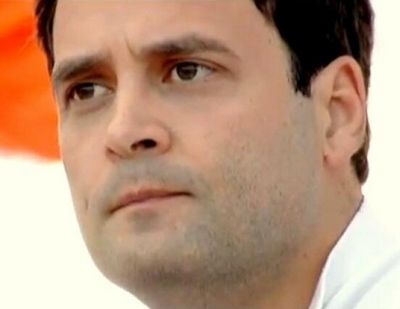 | « Back to article | Print this article |

'Rahul has to take the lead'
'Congress needs cadres'
'Bihar, UP elections our immediate challenges'
In an interview with Indian Express, Congress general secretary Digvijaya Singh talks of the party's future.
More than four months after he said Congress vice president Rahul Gandhi “lacked the ruling person temperament”, senior Congress leader Digvijaya Singh on Wednesday described the former as “an intense person, a voracious reader who you can talk to, at length, on any issue.”
Possibly the first Congress leader to speak about this aspect of Rahul Gandhi’s personality, in an interview to the Indian Express, Singh urged him to be more “hands-on” in organisational matters, something “I don’t think he is now”, at least “not totally”.
Rahul “has gone through a lot of trauma at a formative phase (after his grandmother and father were assassinated) but he has to lead. Almost everyone in the country is waiting for the leadership to draw up a roadmap and tell the cadres what to do,” the Congress general secretary who is believed to have mentored Gandhi, told the newspaper.
And the way ahead for the party, according to Singh, is to go from being a mass movement party to a cadre-based party, like rival Bharatiya Janata Party which recently worsted it in the general elections. “After all,” Singh asks, “What is the BJP without the RSS cadres?”
“We are a mass-movement party. But now, where are the masses? The masses have dwindled. We need foot soldiers who will convey what the Congress party stands for and believes in, and that is why we need cadres.”
Likening the Congress to a “moving train which anyone could get on and jump off later”, Singh tell the Indian Express, “We missed not having a cadre like the right-wing does, of being in every mohalla, field, road, bus-stand and railway station where cadres are trained to speak continuously about what the Congress stands for.”
Dismissing rebellion like in the Tamil Nadu Congress and rumblings of dissatisfaction elsewhere after the dismal elections results as inconsequential – “like in 1978 when there was a split as some people left Indira Gandhi, people like these will go. It doesn’t really matter” – Singh said, “What matters is the political will of the leadership to draw up a new roadmap for the revival of the Congress party.”
Admitting that such a roadmap was drawn up before, he says, “In 2004-05, a party committee to look at future challenges was set up. We met and drew up a report. And also stressed the importance of organisational discipline.”
While nothing came of that exercise, Singh feels it is the need of the hour now “because the demographic profile is changing”.
“India is becoming more urban, it is becoming more middle class. Even Scheduled Castes, Scheduled Tribes and the underprivileged have moved into the middle class mindset. So, we have to reorient our policies, our organisational structure,” he tells the newspaper’s Seema Chishti.
Listing the Bihar assembly elections in 2015 and in Uttar Pradesh in 2017 as the Congress’s “immediate challenges,” Singh said, “There are no shortcuts in politics. With or without alliances, we have to prepare for each of these state polls.”
And “all are prepared to fight it out.”